约翰·斯坦贝克的诺贝尔文学奖获奖感言
约翰斯坦贝克的语录
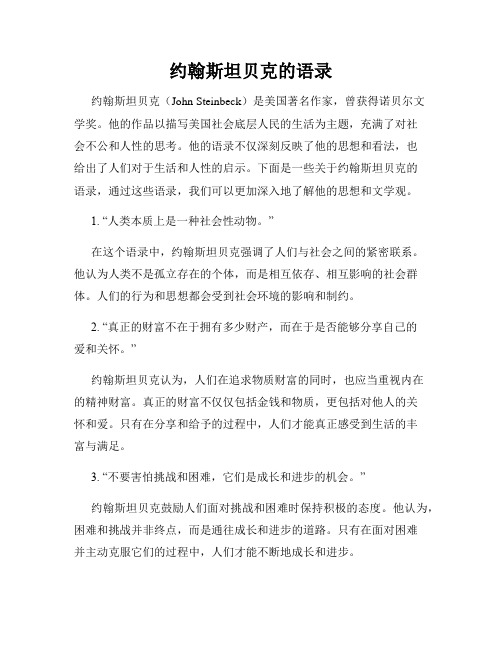
约翰斯坦贝克的语录约翰斯坦贝克(John Steinbeck)是美国著名作家,曾获得诺贝尔文学奖。
他的作品以描写美国社会底层人民的生活为主题,充满了对社会不公和人性的思考。
他的语录不仅深刻反映了他的思想和看法,也给出了人们对于生活和人性的启示。
下面是一些关于约翰斯坦贝克的语录,通过这些语录,我们可以更加深入地了解他的思想和文学观。
1. “人类本质上是一种社会性动物。
”在这个语录中,约翰斯坦贝克强调了人们与社会之间的紧密联系。
他认为人类不是孤立存在的个体,而是相互依存、相互影响的社会群体。
人们的行为和思想都会受到社会环境的影响和制约。
2. “真正的财富不在于拥有多少财产,而在于是否能够分享自己的爱和关怀。
”约翰斯坦贝克认为,人们在追求物质财富的同时,也应当重视内在的精神财富。
真正的财富不仅仅包括金钱和物质,更包括对他人的关怀和爱。
只有在分享和给予的过程中,人们才能真正感受到生活的丰富与满足。
3. “不要害怕挑战和困难,它们是成长和进步的机会。
”约翰斯坦贝克鼓励人们面对挑战和困难时保持积极的态度。
他认为,困难和挑战并非终点,而是通往成长和进步的道路。
只有在面对困难并主动克服它们的过程中,人们才能不断地成长和进步。
4. “爱是人类最强大的力量。
”约翰斯坦贝克相信爱是人类最强大的力量。
爱不仅能够激发人们的内在动力,还能够改变世界。
他认为,只有通过爱和宽容,人类才能摆脱仇恨和冲突,实现和平与和谐的共处。
5. “当一个人聆听自己内心的声音时,他会找到真正的自我。
”约翰斯坦贝克强调了内心的重要性。
他认为,人们只有静下心来聆听内心的声音,才能找到真正的自我。
通过与内心的对话和反思,人们可以更好地认识自己,找到人生的方向和目标。
6. “人类之间的联系比我们所想象的要紧密得多。
”约翰斯坦贝克认为,人与人之间的联系远比我们所想象的要紧密得多。
他认为,我们每个人都是一个整体中的一部分,我们的行为和选择都会影响到其他人。
诺贝尔文学奖获奖感言
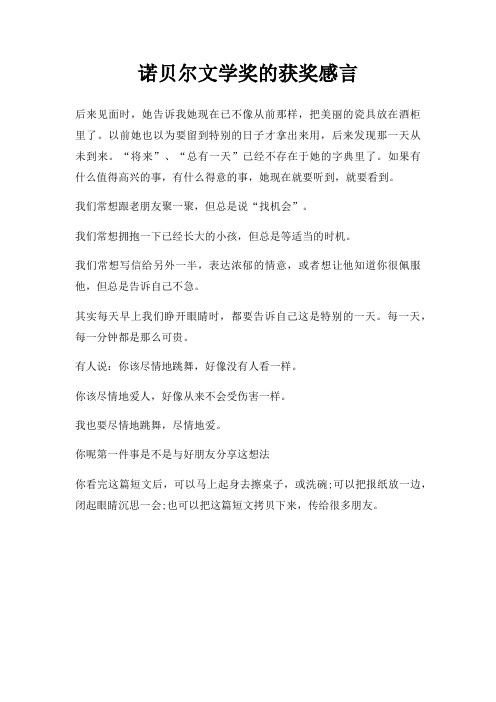
诺贝尔文学奖的获奖感言
后来见面时,她告诉我她现在已不像从前那样,把美丽的瓷具放在酒柜里了。
以前她也以为要留到特别的日子才拿出来用,后来发现那一天从未到来。
“将来”、“总有一天”已经不存在于她的字典里了。
如果有什么值得高兴的事,有什么得意的事,她现在就要听到,就要看到。
我们常想跟老朋友聚一聚,但总是说“找机会”。
我们常想拥抱一下已经长大的小孩,但总是等适当的时机。
我们常想写信给另外一半,表达浓郁的情意,或者想让他知道你很佩服他,但总是告诉自己不急。
其实每天早上我们睁开眼睛时,都要告诉自己这是特别的一天。
每一天,每一分钟都是那么可贵。
有人说:你该尽情地跳舞,好像没有人看一样。
你该尽情地爱人,好像从来不会受伤害一样。
我也要尽情地跳舞,尽情地爱。
你呢第一件事是不是与好朋友分享这想法
你看完这篇短文后,可以马上起身去擦桌子,或洗碗;可以把报纸放一边,闭起眼睛沉思一会;也可以把这篇短文拷贝下来,传给很多朋友。
诺贝尔文学奖获奖致辞
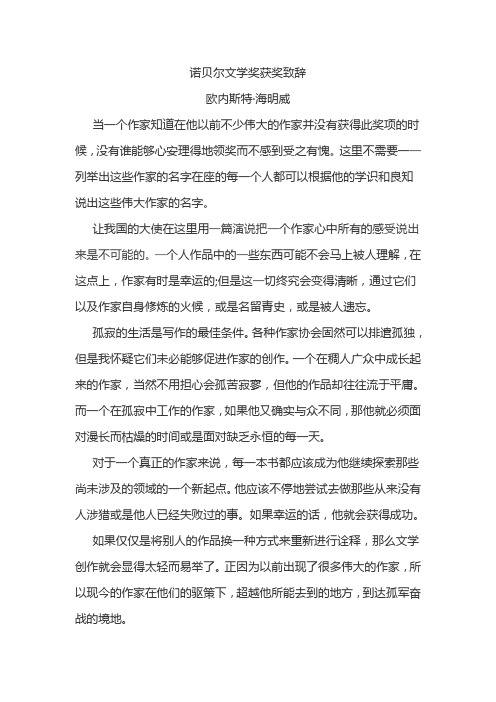
诺贝尔文学奖获奖致辞
欧内斯特·海明威
当一个作家知道在他以前不少伟大的作家并没有获得此奖项的时候,没有谁能够心安理得地领奖而不感到受之有愧。
这里不需要一一列举出这些作家的名字在座的每一个人都可以根据他的学识和良知说出这些伟大作家的名字。
让我国的大使在这里用一篇演说把一个作家心中所有的感受说出来是不可能的。
一个人作品中的一些东西可能不会马上被人理解,在这点上,作家有时是幸运的;但是这一切终究会变得清晰,通过它们以及作家自身修炼的火候,或是名留青史,或是被人遗忘。
孤寂的生活是写作的最佳条件。
各种作家协会固然可以排遣孤独,但是我怀疑它们未必能够促进作家的创作。
一个在稠人广众中成长起来的作家,当然不用担心会孤苦寂寥,但他的作品却往往流于平庸。
而一个在孤寂中工作的作家,如果他又确实与众不同,那他就必须面对漫长而枯燥的时间或是面对缺乏永恒的每一天。
对于一个真正的作家来说,每一本书都应该成为他继续探索那些尚未涉及的领域的一个新起点。
他应该不停地尝试去做那些从来没有人涉猎或是他人已经失败过的事。
如果幸运的话,他就会获得成功。
如果仅仅是将别人的作品换一种方式来重新进行诠释,那么文学创作就会显得太轻而易举了。
正因为以前出现了很多伟大的作家,所以现今的作家在他们的驱策下,超越他所能去到的地方,到达孤军奋战的境地。
作为一个作家,我讲的话已经太多了。
作家应该把自己要说的话写下来,而不是说出来。
再一次谢谢大家。
诺贝尔获奖者领奖词

• 播的,它既不是供深居简出的特权 阶层娱乐的,也并非是陷于绝望、 但又喜好自吹的乞丐们的一种游戏。 • 文学与言语一样源远流长,它是 应人们的需求而产生的,除了对这 种需求的日益增长外,文学并没有 发生什么变化。吟唱诗人、行吟诗 人和作家并不是独立的和相互排斥 的,从一开始,他们的作用、义务 和职责就由我们人类规定好了。
• for transforming the way that we use energy. • We can't allow the differences between peoples to define the way that we see one another. And that's why we must pursue a new beginning among people of different faiths and races and religions, one based upon mutual interest and mutual respect. • And we must all do our part to resolve those conflicts that have caused so much pain and hardship over so many years.
• 能或不会与之齐头并进。无疑,作家 的部分职责就是确保它们一起向前发 展。人类曾坚定不移地与一切自然界 的仇敌进行斗争,有时几乎不可避免 的失败和毁灭,既然我们有着如此悠 久并值得自豪的历史,那么,倘若我 们还未能取得伟大的胜利就逃离战场, 那我们就成了懦夫和愚人。
奥巴马的获奖感言
• Good morning. Well, this is not how I expected to wake up this morning. After I received the news, Malia walked in and said, "Daddy, you won the Nobel Peace Prize, and it is Bo's birthday." And then Sasha added, "Plus, we have a three-day weekend coming up." So it's -- it's good to have kids to keep things in perspective.
历届诺贝尔文学奖金句

历届诺贝尔文学奖金句1.'我们都是流浪者,但有时候我们会在某个地方暂停,这个地方就是家。
' ——托马斯·曼 (1929年诺贝尔文学奖)2. '文学是人类的一种本能,就像饮食、住房和爱情一样。
' ——约翰·斯特恩 (1949年诺贝尔文学奖)3. '诗歌不是一种简单的组织形式,而是一种渗透到生活中的哲学。
' ——蒲柏 (1960年诺贝尔文学奖)4. '文学是我们的思想、我们的生活和我们的文化的记录。
' ——约翰·斯坦贝克 (1962年诺贝尔文学奖)5. '文学是我们心灵的一面镜子,它能够反映出我们的想法、情感和梦想。
' ——加布里埃尔·加西亚·马尔克斯 (1982年诺贝尔文学奖)6. '文学是一种有关人类生活的艺术形式,它可以让我们更好地理解自己的过去、现在和未来。
' ——威廉·戈尔丁 (1983年诺贝尔文学奖)7. '文学是一种力量,它能够塑造我们的思想和情感,让我们更加深刻地理解自己和世界。
' ——纳丁·戈迪默 (1991年诺贝尔文学奖)8. '文学是一种通往理解和同情的桥梁,它能够让我们更好地理解他人的想法和感受。
' ——托尼·莫里森 (1993年诺贝尔文学奖) 9. '文学是一种探索人类存在的方式,它能够让我们更好地理解自己的存在和意义。
' ——塞缪尔·贝克特 (1969年诺贝尔文学奖)10. '文学是一种表达真相和灵魂的方式,它能够帮助我们更好地认识自己和世界。
英文获奖感言3篇_礼仪
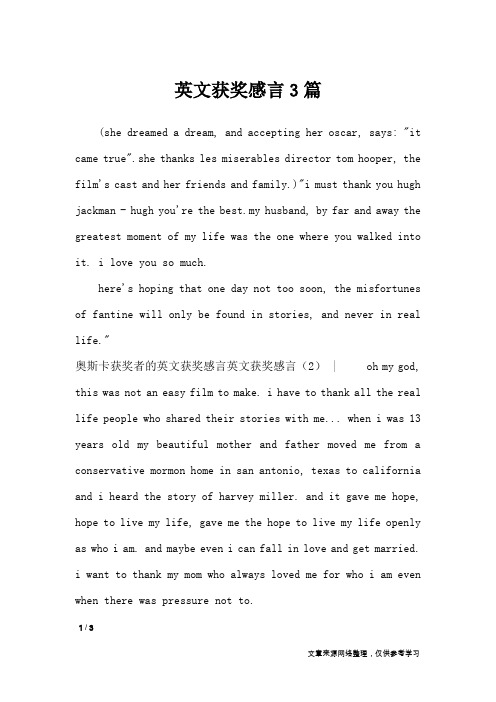
英文获奖感言3篇(she dreamed a dream, and accepting her oscar, says: "it came true".she thanks les miserables director tom hooper, the film's cast and her friends and family.)"i must thank you hugh jackman - hugh you're the best.my husband, by far and away the greatest moment of my life was the one where you walked into it. i love you so much.here's hoping that one day not too soon, the misfortunes of fantine will only be found in stories, and never in real life."奥斯卡获奖者的英文获奖感言英文获奖感言(2) | oh my god, this was not an easy film to make. i have to thank all the real life people who shared their stories with me... when i was 13 years old my beautiful mother and father moved me from a conservative mormon home in san antonio, texas to california and i heard the story of harvey miller. and it gave me hope, hope to live my life, gave me the hope to live my life openly as who i am. and maybe even i can fall in love and get married.i want to thank my mom who always loved me for who i am even when there was pressure not to.1 / 3if harvey had been alive today, i think he'd want me to say to all the gay and lesbian kids out there that have been told that they are less than by their churches, their government or their families that they are beautiful, wonderful creatures of value and no matter what anyone tells you, god does love you and that very soon i promise you, you will have equal rights, federally, across this great nation of ours. thank you. thank you. and thank you, god, for giving us harvey milk.奥斯卡颁奖典礼的英文获奖感言英文获奖感言(3) | good evening! ladies and gentlemen,thank you! thank you so much! oh, my god. i just can’t believe it. is it real or just a dream? please forgive me, i am, i am just so shocked and so thankful. i never expected this award tonight. i’m very grateful to receive this award for “best actress.”i can’t begin to tell you how much i appreciate this great honor. there are so many people i’d like to thank. first of all, i want to thank my parents for bringing me into this world.i also want to express my gratitude to all of my teachers over the years, but especially to my acting teacher clark johnson who taught me everything i know.2 / 3i want to thank my husband, for his understanding and kindness. and finally, i want to express my appreciation to all of my friends for their support, especially to martin miller, for being there when i needed him. there are just too many people i should thank and i know i am probably forgetting someone. so again, i just want to say thank you to everyone who helped me, supported me, or just listened to me when i needed a shoulder to cry on.this award means a great deal to me. words can’t express how honored i feel at this moment. i will remember this night for the rest of my life! thank you very much.约翰·斯坦贝克诺贝尔文学奖的英文获奖感言3 / 3。
2018年诺贝尔获奖感言英文-范文模板 (9页)

2018年诺贝尔获奖感言英文-范文模板本文部分内容来自网络,本司不为其真实性负责,如有异议或侵权请及时联系,本司将予以删除!== 本文为word格式,下载后可随意编辑修改! ==诺贝尔获奖感言英文约翰·斯坦贝克诺贝尔文学奖的英文获奖感言1banquet speechjohn steinbeck's speech at the nobel banquet at the city hall in stockholm, december 10, 1962i thank the swedish academy for finding my work worthy of this highest honor.in my heart there may be doubt that i deserve the nobel award over other men of letters whom i hold in respect and reverence - but there is no question of my pleasure and pride in having it for myself.it is customary for the recipient of this award to offer personal or scholarly comment on the nature and the direction of literature. at this particular time, however, i think it would be well to consider the high duties and the responsibilities of the makers of literature.such is the prestige of the nobel award and of this place where i stand that i am impelled, not to squeak like a grateful and apologetic mouse, but to roar like a lion out of pride in my profession and in the great and good men who have practiced it through the ages.literature was not promulgated by a pale and emasculated critical priesthood singing their litanies in empty churches - nor is it a game for the cloistered elect, the tinhorn mendicants of low calorie despair.。
约翰斯坦贝克美国现实主义文学巨匠的经典语录
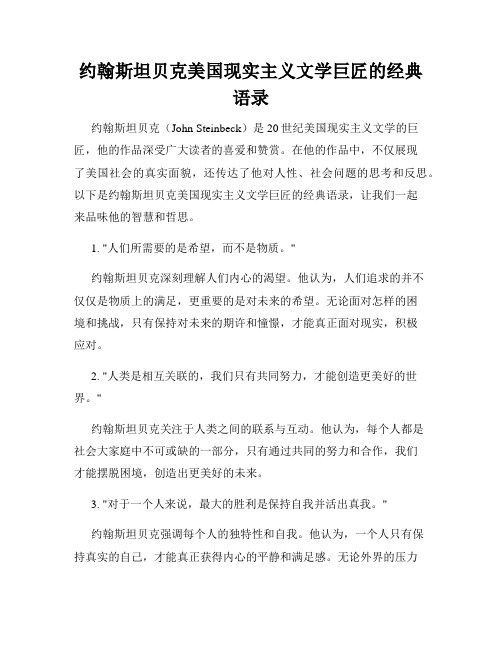
约翰斯坦贝克美国现实主义文学巨匠的经典语录约翰斯坦贝克(John Steinbeck)是20世纪美国现实主义文学的巨匠,他的作品深受广大读者的喜爱和赞赏。
在他的作品中,不仅展现了美国社会的真实面貌,还传达了他对人性、社会问题的思考和反思。
以下是约翰斯坦贝克美国现实主义文学巨匠的经典语录,让我们一起来品味他的智慧和哲思。
1. "人们所需要的是希望,而不是物质。
"约翰斯坦贝克深刻理解人们内心的渴望。
他认为,人们追求的并不仅仅是物质上的满足,更重要的是对未来的希望。
无论面对怎样的困境和挑战,只有保持对未来的期许和憧憬,才能真正面对现实,积极应对。
2. "人类是相互关联的,我们只有共同努力,才能创造更美好的世界。
"约翰斯坦贝克关注于人类之间的联系与互动。
他认为,每个人都是社会大家庭中不可或缺的一部分,只有通过共同的努力和合作,我们才能摆脱困境,创造出更美好的未来。
3. "对于一个人来说,最大的胜利是保持自我并活出真我。
"约翰斯坦贝克强调每个人的独特性和自我。
他认为,一个人只有保持真实的自己,才能真正获得内心的平静和满足感。
无论外界的压力和诱惑如何,只要坚持信仰,并保持真实的自己,就能取得最大的胜利。
4. "人性的善良是无穷的,只有在最黑暗的时刻,我们才能看到它的光芒。
"约翰斯坦贝克对人性持有积极的态度。
他相信人性本善,并认为无论多么黑暗的时刻,人们内心深处总会存在着善良和正义的火花。
只有在面临困难和挑战之际,我们才能看到人性的光芒。
5. "社会不应该定义一个人的价值,每个个体都应该被尊重和平等对待。
"约翰斯坦贝克批判了社会对个体的标签化和歧视现象。
他认为,每个人都应该被平等地对待,不论他们的社会地位、职业、种族等。
每个人都有自己的独特价值,社会应该给予每个人平等的机会和尊重。
6. "人们对未知的恐惧超过了对现实的忍受。
2018-诺贝尔获奖感言英文-推荐word版 (9页)

本文部分内容来自网络整理所得,本司不为其真实性负责,如有异议或侵权请及时联系,本司将立即予以删除!== 本文为word格式,下载后可方便编辑修改文字! ==诺贝尔获奖感言英文约翰·斯坦贝克诺贝尔文学奖的英文获奖感言1banquet speechjohn steinbeck's speech at the nobel banquet at the city hall in stockholm, december 10, 1962i thank the swedish academy for finding my work worthy of this highest honor.in my heart there may be doubt that i deserve the nobel award over other men of letters whom i hold in respect and reverence - but there is no question of my pleasure and pride in having it for myself.it is customary for the recipient of this award to offer personal or scholarly comment on the nature and the direction of literature. at this particular time, however, i think it would be well to consider the high duties and the responsibilities of the makers of literature.such is the prestige of the nobel award and of this place where i stand that i am impelled, not to squeak like a grateful and apologetic mouse, but to roar like a lion out of pride in my profession and in the great and good men who have practiced it through the ages.literature was not promulgated by a pale and emasculated critical priesthood singing their litanies in empty churches - nor is it a game for the cloistered elect, the tinhorn mendicants of low calorie despair.literature is as old as speech. it grew out of human need for it, and it has not changed except to become more needed.the skalds, the bards, the writers are not separate and exclusive. from the beginning, their functions, their duties, their responsibilities have been decreed by our species.humanity has been passing through a gray and desolate time of confusion. my great predecessor, william faulkner, speaking here, referred to it as a tragedy of universal fear so long sustained that there were no longer problems of the spirit, so that only the human heart in conflict with itself seemed worth writing about.faulkner, more than most men, was aware of human strength as well as of human weakness. he knew that the understanding and the resolution of fear are a large part of the writer's reason for being.this is not new. the ancient commission of the writer has not changed. he is charged with exposing our many grievous faults and failures, with dredging up to the light our dark and dangerous dreams for the purpose of improvement.furthermore, the writer is delegated to declare and to celebrate man's proven capacity for greatness of heart and spirit - for gallantry in defeat - for courage, compassion and love. in the endless war against weakness and despair, these are the bright rally-flags of hope and of emulation.i hold that a writer who does not passionately believe in the perfectibility of man, has no dedication nor any membership in literature.the present universal fear has been the result of a forward surge in our knowledge and manipulation of certain dangerous factors in the physical world.it is true that other phases of understanding have not yet caught up with this great step, but there is no reason to presume that they cannot or will not draw abreast. indeed it is a part of the writer's responsibility to make sure that they do.with humanity's long proud history of standing firm against natural enemies, sometimes in the face of almost certain defeat and extinction, we would be cowardly and stupid to leave the field on the eve of our greatest potential victory.understandably, i have been reading the life of alfred nobel - a solitary man, the books say, a thoughtful man. he perfected the release of explosive forces, capable of creative good or of destructive evil, but lacking choice, ungoverned by conscience or judgment.nobel saw some of the cruel and bloody misuses of his inventions. he may even have foreseen the end result of his probing - access to ultimate violence - to final destruction. some say that he became cynical, but i do not believe this. i think he strove to invent a control, a safety valve. i think he found it finally only in the human mind and the human spirit. to me, his thinking is clearly indicated in the categories of these awards.they are offered for increased and continuing knowledge of man and of his world - for understanding and communication, which are the functions of literature. and they are offered for demonstrations of the capacity for peace - the culmination of all the others.less than fifty years after his death, the door of nature was unlocked and we were offered the dreadful burden of choice.we have usurped many of the powers we once ascribed to god.fearful and unprepared, we have assumed lordship over the life or death of the whole world - of all living things.the danger and the glory and the choice rest finally in man. the test of his perfectibility is at hand.having taken godlike power, we must seek in ourselves for the responsibility and the wisdom we once prayed some deity might have.man himself has become our greatest hazard and our only hope.so that today, st. john the apostle may well be paraphrased: in the end is the word, and the word is man - and the word is with men.诺贝尔奖获得者Obama英语获奖感言2Good morning. Well, this is not how I expected to wake up this morning. After I received the news, Malia walked in and said, "Daddy, you won the Nobel Peace Prize, and it is Bo's birthday." And then Sasha added, "Plus, we have a three-day weekend coming up." So it's -- it's good to have kids to keep things in perspective.早上好。
约翰·斯坦贝克诺贝尔文学奖的英文获奖感言_获奖感言_

约翰·斯坦贝克诺贝尔文学奖的英文获奖感言Banquet SpeechJohn Steinbeck's speech at the Nobel Banquet at the City Hall in Stockholm, December 10, 1962I thank the Swedish Academy for finding my work worthy of this highest honor.In my heart there may be doubt that I deserve the Nobel award over other men of letters whom I hold in respect and reverence - but there is no question of my pleasure and pride in having it for myself.It is customary for the recipient of this award to offer personal or scholarly comment on the nature and the direction of literature. At this particular time, however, I think it would be well to consider the high duties and the responsibilities of the makers of literature.Such is the prestige of the Nobel award and of this place where I stand that I am impelled, not to squeak like a grateful and apologetic mouse, but to roar like a lion out of pride in my profession and in the great and good men who have practiced it through the ages.Literature was not promulgated by a pale and emasculated critical priesthood singing their litanies in empty churches - nor is it a game for the cloistered elect, the tinhorn mendicants of low calorie despair.Literature is as old as speech. It grew out of human need for it, and it has not changed except to become more needed.The skalds, the bards, the writers are not separate and exclusive. From the beginning, their functions, their duties, their responsibilities have been decreed by our species.Humanity has been passing through a gray and desolate time of confusion. My great predecessor, William Faulkner, speaking here, referred to it as a tragedy of universal fear so long sustained that there were no longer problems of the spirit, so that only the human heart in conflict with itself seemed worth writing about.Faulkner, more than most men, was aware of human strength as well as of human weakness. He knew that the understanding and the resolution of fear are a large part of the writer's reason for being.This is not new. The ancient commission of the writer has not changed. He is charged with exposing our many grievous faults and failures, with dredging up to the light our dark and dangerous dreams for the purpose of improvement.Furthermore, the writer is delegated to declare and to celebrate man's proven capacity for greatness of heart and spirit - for gallantry in defeat - for courage, compassion and love. In the endless war against weakness and despair, these are the bright rally-flags of hope and of emulation.I hold that a writer who does not passionately believe in the perfectibility of man, has no dedication nor any membership in literature.The present universal fear has been the result of a forward surge in our knowledge and manipulation of certain dangerous factors in the physical world.It is true that other phases of understanding have not yet caught up with this great step, but there is no reason to presume that they cannot or will not draw abreast. Indeed it is a part of the writer's responsibility to make sure that they do.With humanity's long proud history of standing firm againstnatural enemies, sometimes in the face of almost certain defeat and extinction, we would be cowardly and stupid to leave the field on the eve of our greatest potential victory.Understandably, I have been reading the life of Alfred Nobel - a solitary man, the books say, a thoughtful man. He perfected the release of explosive forces, capable of creative good or of destructive evil, but lacking choice, ungoverned by conscience or judgment.Nobel saw some of the cruel and bloody misuses of his inventions. He may even have foreseen the end result of his probing - access to ultimate violence - to final destruction. Some say that he became cynical, but I do not believe this. I think he strove to invent a control, a safety valve. I think he found it finally only in the human mind and the human spirit. To me, his thinking is clearly indicated in the categories of these awards.They are offered for increased and continuing knowledge of man and of his world - for understanding and communication, which are the functions of literature. And they are offered for demonstrations of the capacity for peace - the culmination of all the others.Less than fifty years after his death, the door of nature was unlocked and we were offered the dreadful burden of choice.We have usurped many of the powers we once ascribed to God.Fearful and unprepared, we have assumed lordship over the life or death of the whole world - of all living things.The danger and the glory and the choice rest finally in man. The test of his perfectibility is at hand.Having taken Godlike power, we must seek in ourselves for the responsibility and the wisdom we once prayed some deitymight have.Man himself has become our greatest hazard and our only hope.So that today, St. John the apostle may well be paraphrased: In the end is the Word, and the Word is Man - and the Word is with Men.。
斯坦贝克诺贝尔获奖感言中文版

斯坦贝克诺贝尔获奖感言中文版大家好,今天咱们要聊聊一个特别的故事。
你们肯定知道,美国作家约翰·斯坦贝克,他是诺贝尔文学奖的得主。
可你们知道,他的获奖感言是怎样的吗?这个感言并没有什么华丽的辞藻,反而是朴实无华,带着一种平实而真诚的情感,完全不像一个大作家的样子,倒更像是一个普通人站在台上,说出自己心里最真实的话。
就像是我们平时和朋友聊天时那种自然、随和的语气,不加修饰,情感却特别真挚。
你想想,这个诺贝尔文学奖的领奖感言本身,跟他的作品一样,都是那么的“接地气”。
说实话,斯坦贝克的获奖感言一点也不张扬,甚至有些谦虚。
你看,他说,自己写了这么多年,没想过有一天会站在这个领奖台上,拿这个奖。
他讲的是自己对文学的理解,不是那种高高在上的“我多伟大,我多了不起”,而是讲自己的故事,讲那些支撑他走到今天的东西。
比如说,斯坦贝克说,他的写作并不是为了取悦大众,也不是为了获得名声,而是为了在这个世界上留下些有意义的东西。
他甚至说,他的作品并不完美,甚至很多地方都做得不够好,但他始终坚持自己所信仰的东西。
这种不吹不擂、不夸大其词的态度,让人听了特别舒服。
不过,你也能从他的感言里感觉到一种深深的责任感。
他没有高高在上地把自己当成一个“天才”,也没把奖当作是某种无上的荣耀,而是将它当作一种对社会的责任。
他说,作家的任务是去关注那些被忽视的人,去讲述那些在社会的边缘挣扎的人物。
他讲了很多关于贫穷、关于无助、关于人性的事。
这些话,说实话,听了让人心里有点发酸。
他没有站在领奖台上大谈个人成就,反而是把所有的目光都投向了那些需要被关注的群体。
这一点,真的是让人特别感动。
斯坦贝克也特别重视“诚实”这个词。
他的作品里也一直强调这个观点——无论社会如何变化,作家都不能忘记去做一个诚实的人。
他认为,作家的使命就是要真实地反映世界,哪怕这个世界充满了丑陋与不公。
你要是读过他的《愚昧的太阳》或者《西风的死地》这些作品,就会发现,他的笔下充满了对社会问题的敏感,对人性的挖掘,对那些被压迫的群体的同情。
约翰·斯坦贝克
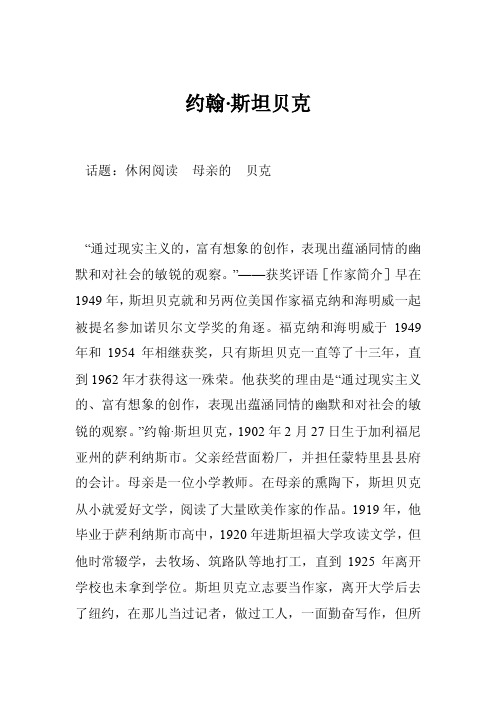
约翰·斯坦贝克话题:休闲阅读母亲的贝克“通过现实主义的,富有想象的创作,表现出蕴涵同情的幽默和对社会的敏锐的观察。
”——获奖评语[作家简介]早在1949年,斯坦贝克就和另两位美国作家福克纳和海明威一起被提名参加诺贝尔文学奖的角逐。
福克纳和海明威于1949年和1954年相继获奖,只有斯坦贝克一直等了十三年,直到1962年才获得这一殊荣。
他获奖的理由是“通过现实主义的、富有想象的创作,表现出蕴涵同情的幽默和对社会的敏锐的观察。
”约翰·斯坦贝克,1902年2月27日生于加利福尼亚州的萨利纳斯市。
父亲经营面粉厂,并担任蒙特里县县府的会计。
母亲是一位小学教师。
在母亲的熏陶下,斯坦贝克从小就爱好文学,阅读了大量欧美作家的作品。
1919年,他毕业于萨利纳斯市高中,1920年进斯坦福大学攻读文学,但他时常辍学,去牧场、筑路队等地打工,直到1925年离开学校也未拿到学位。
斯坦贝克立志要当作家,离开大学后去了纽约,在那儿当过记者,做过工人,一面勤奋写作,但所写的作品一直没有得到发表的机会。
1926年,他只好又回到加州,一面继续写作,一面靠打工维持生活。
他做过牧场和农场雇工、木工学徒、油漆匠、搬运工、化验员、筑路工人、猎场看守、报刊记者,接触过许多社会底层人民,熟悉他们的日常生活和思想感情;他长期生活在小镇、乡村和牧场,热爱山野的自然风光,又有深厚的文学素养,这一切为他今后的文学创作奠定了坚实的基础。
1929年,他终于出版了第一部长篇小说《金杯》,作品写的是海盗亨利·摩根怎样成为总督的故事。
随后,他又相继创作了描写加州几户农民生活的长篇小说《天堂牧场》(1932)和以一个家族西迁加州拓荒为题材的长篇小说《献给一位未知的神》(1933),但是这几部作品的出版都没有引起多大的反响。
直到1934年他的短篇小说《谋杀》获欧·亨利奖,1935年他的中篇小说《煎饼坪》问世,并获得加利福尼亚州俱乐部金牌奖,他的作品才引起评论界的注意。
英文感言4篇

英文感言4篇篇一:hi everyone,my name is dongqi yang from china, i am horror to be here today and i am very happy to receive this award.as you can imagine, as international students in australia, the biggest challenge is english,i remembered that when i come here first time, there is a party in the house of my home stay. during the time, they played jokes and they laughed all the time, do you know how embarrassed that is, everyone laughed except you. so i pretend to understand the joke in another party, i saw everyone laugh and i laugh too in 5 seconds later. my home stay was surprised about that and asked me do you understand? ,and i answered no ,so why do you laugh? because i do not want to be embarrassed !but as i receive this award today, i want to thank to them, because they encourage me to be involved with the committee rar than staying in at home, play computer and speak chinese.when i came to wantirna college first time, i met liz collar who is international student coordinator. she is very kind to me, and she encourage me join src, i went to src meetings regularly all the time, but i didn t even know what src was! that is the reason why i told her, i don t want to go to src anymore. but she said why not? you should go and you have to go! i asked why? she said: because i said so!but as ii receive this award today, i want to thank her. she helps me a lot.truth be told, i am not the best student in wantirna college, but i appreciate this award and i will try my best in future.i think i got 10 seconds left, i want to thank to les and vera who is my lovely home stay, thanks to liz collar who is international student coordinator, i strongly want to thank to my mother, because she support me and gave me the opportunity to come to australia. and thanks to wantinran college, thanks to australia and finally, thanks to everyone to be here tonight.have a great night.篇二:第83届奥斯卡金像奖将于北京时间2月28日上午9点(当地时间2月27日下午17点)在洛杉矶柯达剧院举行,christian bale 获得第83届奥斯卡最佳男配角,下面是克里斯蒂安贝尔的奥斯卡火箭感言演讲视频和。
诺贝尔文学奖获奖感言_高三作文
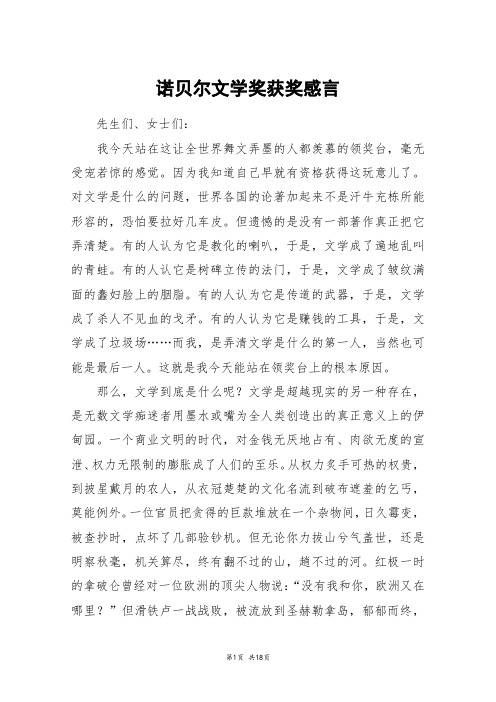
诺贝尔文学奖获奖感言先生们、女士们:我今天站在这让全世界舞文弄墨的人都羡慕的领奖台,毫无受宠若惊的感觉。
因为我知道自己早就有资格获得这玩意儿了。
对文学是什么的问题,世界各国的论著加起来不是汗牛充栋所能形容的,恐怕要拉好几车皮。
但遗憾的是没有一部著作真正把它弄清楚。
有的人认为它是教化的喇叭,于是,文学成了遍地乱叫的青蛙。
有的人认它是树碑立传的法门,于是,文学成了皱纹满面的蠢妇脸上的胭脂。
有的人认为它是传道的武器,于是,文学成了杀人不见血的戈矛。
有的人认为它是赚钱的工具,于是,文学成了垃圾场……而我,是弄清文学是什么的第一人,当然也可能是最后一人。
这就是我今天能站在领奖台上的根本原因。
那么,文学到底是什么呢?文学是超越现实的另一种存在,是无数文学痴迷者用墨水或嘴为全人类创造出的真正意义上的伊甸园。
一个商业文明的时代,对金钱无厌地占有、肉欲无度的宣泄、权力无限制的膨胀成了人们的至乐。
从权力炙手可热的权贵,到披星戴月的农人,从衣冠楚楚的文化名流到破布遮羞的乞丐,莫能例外。
一位官员把贪得的巨款堆放在一个杂物间,日久霉变,被查抄时,点坏了几部验钞机。
但无论你力拔山兮气盖世,还是明察秋毫,机关算尽,终有翻不过的山,趟不过的河。
红极一时的拿破仑曾经对一位欧洲的顶尖人物说:“没有我和你,欧洲又在哪里?”但滑铁卢一战战败,被流放到圣赫勒拿岛,郁郁而终,而欧洲依然存在,甚至是一种好得多的存在。
秦始皇“挥剑绝浮云”,谋开万世不朽的基业,二世而亡。
曾是“胡人不敢南下而牧马,士不敢弯弓而抱怨”的秦帝国竟然禁不住起于垄亩的陈涉振臂一呼。
秦始皇的结局也不过是“金棺葬寒灰”而已。
造物主是一个幽默大师,你一旦对谋种东西迷醉,那东西就会反过来制约你,也许这就是哲学上的所谓异化。
用我们的方言来说,就是会枪上死,会水水上亡。
因此,在快节奏,强竞争的时代,我们别只顾为大印、金钱卖命,我们还得学会为自己另外寻找一处蜗居,让我们的身体到休息,灵魂得以皈依。
诺贝尔文学奖颁奖词与获奖演说全集[定稿]
![诺贝尔文学奖颁奖词与获奖演说全集[定稿]](https://img.taocdn.com/s3/m/c22b1f1cbc64783e0912a21614791711cc7979ef.png)
诺贝尔文学奖颁奖词与获奖演说全集[定稿]第一篇:诺贝尔文学奖颁奖词与获奖演说全集[定稿]历届诺贝尔文学奖得主及其颁奖词2009-08-29 09:32 诺贝尔文学奖简介诺贝尔文学奖,是阿尔弗雷德·诺贝尔设立的诺贝尔奖中的一个奖项。
诺贝尔在遗嘱中说奖金的一部分应该“奖给在文学界创作出具有理想倾向的最佳作品的人”。
诺贝尔文学奖由瑞典文学院颁奖。
1900年代 1901年苏利·普吕多姆(法国诗人)《孤独与深思》是高尚的理想、完美的艺术和罕有的心灵与智慧的实证 1902年特奥多尔·蒙森(德国历史学家)《罗马风云》今世最伟大的纂史巨匠,此点于其巨著《罗马史》中表露无疑1903年比昂斯滕·比昂松,挪威戏剧家、诗人、小说家《挑战的手套》他以诗人鲜活的灵感和难得的赤子之心,把作品写得雍容、华丽而又缤纷 1904年弗雷德里克·米斯塔尔,法国诗人《金岛》他的诗作蕴涵之清新创造性与真正的感召力,它忠实地反映了他民族的质朴精神何塞·埃切加赖,西班牙戏剧家、诗人《伟大的牵线人》由于它那独特和原始风格的丰富又杰出,作品恢复了西班牙喜剧的伟大传统 1905年亨利克·显克维支,波兰小说家《第三个女人》由于他在历史小说写作上的卓越成就 1906年乔祖埃·卡尔杜齐,意大利诗人、文艺批评家《青春诗》不仅是由于他精深的学识和批判性的研究,更重要是为了颂扬他诗歌杰作中所具有的特色、创作气势,清新的风格和抒情的魅力 1907年约瑟夫·鲁德亚德·吉卜林,英国小说家、诗人《老虎!老虎!》这位世界名作家的作品以观察入微、想象独特、气概雄浑、叙述卓越见长 1908年鲁道尔夫·欧肯,德国哲学家《精神生活漫笔》他对真理的热切追求、他对思想的贯通能力、他广阔的观察,以及他在无数作品中,辩解并阐释一种理想主义的人生哲学时,所流露的热诚与力量 1909年西尔玛·拉格洛夫,瑞典作家《骑鹅旅行记》由于她作品中特有的高贵的理想主义、丰富的想象力、平易而优美的风格 [编辑]1910年代 1910年保尔·约翰·路德维希·冯·海塞,德国作家《特雷庇姑娘》表扬这位抒情诗人、戏剧家、小说家以及举世闻名的短篇小说家,在他漫长而多产的创作生涯中,所达到的充满理想主义精神之艺术至境 1911年莫里斯·梅特林克,比利时剧作家、诗人、散文家《花的智慧》由于他在文学上多方面的表现,尤其是戏剧作品,不但想象丰富,充满诗意的奇想,有时虽以神话的面貌出现,还是处处充满了深刻的启示。
约翰斯坦贝克美国作家诺贝尔文学奖得主

约翰斯坦贝克美国作家诺贝尔文学奖得主约翰斯坦贝克(John Steinbeck)是20世纪美国最负盛名的作家之一,他以其逼真的刻画和深入的社会观察而闻名于世。
在他的作品中,他描绘了美国农民、工人和流浪汉的生活,展现了当时的社会现实和人类的困境。
他的作品被广泛研究和欣赏,他本人也因此荣获诺贝尔文学奖,成为历史上仅有的几位获得该奖项的美国作家之一。
约翰斯坦贝克生于1902年,他在加州的一个农民家庭中长大,初期的生活经历对他后来的写作产生了深远的影响。
他在加州立大学学习了几年,然而,由于缺乏资金和对大学教育不感兴趣,他辍学后开始了流浪的生活,游历美国的大陆,从事各种低级工作。
这段时间的经历成为他后来的作品的重要素材。
约翰斯坦贝克的第一部重要作品是《愤怒的葡萄》(The Grapes of Wrath),这部小说描绘了在大萧条时期的美国西部农民的苦难生活。
小说主要讲述了一个农民家庭被逼迫离开家乡,去往加州寻求更好的生活的故事。
小说通过细致入微的刻画,展现了农民面对环境恶劣和社会不公时所遭受的痛苦和困境。
《愤怒的葡萄》一经出版,立即引起轰动,并使约翰斯坦贝克一举成名。
除了《愤怒的葡萄》,约翰斯坦贝克的其他作品也非常精彩。
他的小说《松鼠镇》(Cannery Row)描绘了美国加州一个渔村的生活,通过鲜明的人物形象和幽默的故事情节,生动地再现了小镇上的琐碎生活和社区精神。
他的另一部重要作品《东大门》(East of Eden)是一部家族史诗,讲述了从19世纪中期到20世纪初的加州农民家庭的故事。
这部小说以其复杂的情节和多维的角色塑造而备受赞誉。
约翰斯坦贝克的作品深受文学界和读者的推崇,他以对社会问题的敏锐观察和对人性的深刻揭示而著称。
他通过他的作品表达了对社会不公和阶级困境的关注,同时也以其细腻的描写和幽默的风格吸引了广大读者。
他的作品被广泛翻译成各种语言,在国际上享有崇高的声誉。
2005年,约翰斯坦贝克被授予诺贝尔文学奖,以表彰他卓越的创作成就和对人类经验的深刻洞察力。
15位诺贝尔文学奖得主的人生哲言

15位诺贝尔文学奖获奖者的人生哲言诺贝尔文学奖是根据诺贝尔1895年的遗嘱而设立的五个诺贝尔奖之一,该奖旨在奖励在文学领域创作出具理想倾向之最佳作品者。
这里辑录了15位获奖者的人生哲言,希望朋友们阅读后能对生活有所启发。
泰戈尔1913年获得诺贝尔文学奖当青春的光彩渐渐消逝,永不衰老的内在个性却在一个人的脸上和眼睛上更加明显地表露出来,好像是在同一地方久住了的结果。
人的痛苦,不仅覆盖着柔软的泪珠,也闪烁着刚毅。
人心中的痛苦,如同世界上的利器。
它是光,它是热,它是运动的,它是生命。
它在弯路上逡巡,在人类社会中创造崭新的劳作的世界和美的世界。
这炽热的痛苦在有的地方显露,在有的地方隐藏,让人世的一切气流不停地循环。
罗曼罗兰1915年获得诺贝尔文学奖没有一个人是完全幸福的。
所谓幸福,是在于认清一个人的限度而安于这个限度。
大部分人在二三十岁上就死去了,因为过了这个年龄,他们只是自己的影子,此后的余生则是在模仿自己中度过,日复一日,更机械,更装腔作势地重复他们在有生之年的所作所为,所思所想,所爱所恨。
叶芝1923年获得诺贝尔文学奖年轻时,我们彼此相爱却浑然不知。
人类的一个大麻烦,在于我们无法拥有说一不二的感情。
敌人身上总有让我们喜欢的地方,我们的爱人总会有让我们讨厌之处。
正是这种纠结不清的情感催我们变老,让我们皱起眉头,加深我们眼周的皱纹。
要是我们能像仙人一样全心全意地爱或者恨,我们也许就能像他们那样长生不老了。
不过,在这一天到来之前,他们永不衰竭的快乐和悲哀在很大程度上正是他们的魅力所在。
他们的爱从不知疲倦,星辰的轮回也绝不会让他们放慢舞步。
萧伯纳1925年获得诺贝尔文学奖人生最大的感叹是:年轻的激情是从未实现;年老的追忆是从没发生。
勇气是青年人漂亮的装饰。
假若人生下来就是中年,然后再渐渐年轻起来,那样,他就会珍惜一切时光,决不会再无谓的事情上消耗自己。
风华正茂夜晚给老年人带来平静,给青年人带来希望。
人生有两出悲剧。
诺贝尔文学奖获奖感言

诺贝尔文学奖获奖感言诺贝尔文学奖获奖感言(略萨)我五岁学会阅读。
那是在玻利维亚科恰班巴的萨耶学校,胡斯蒂尼亚诺修士的课堂上。
这是我一生中最重要的事情。
而今,近七十年时光不再,可我还清楚记得那个魔法如何丰富了我的生活:将书中的文字转化为形象;打破时空屏障,让我同尼莫船长(《海底两万里》人物)一起遨游海底两万里,同达达尼昂、阿托斯、波尔多斯以及阿来米斯(《三个火枪手》人物)并肩作战,粉碎诡计多端的红衣主教黎塞留旨在推翻王后的阴谋,让我化身冉阿让扛着马吕斯(《悲惨世界》人物)那奄奄一息的躯体在巴黎的内脏中跼蹐前行。
阅读把梦想变成生活,又将生活变成梦想,让孩童如我亦能触及文学的广袤天地。
我母亲曾经对我说,我最初的习作其实就是我所读故事的延续,因为我总是为故事的终结而伤心,或是想要改变故事的结局。
或许我一生都在做一件事,尽管我自己全然不知,那就是:从成长到成熟,再到终老,我都在延续着那些令我的童年充满冒险和激动的故事。
我真希望母亲此刻也在这里,她读到阿玛多·内尔沃和巴勃罗·聂鲁达的诗歌时总是动情至流泪。
我也希望佩德罗姥爷在这里,他长着一个大鼻子,头顶秃得铮亮。
他总是对我的诗句赞赏有加。
还有卢乔舅舅,他鼓励我全身心投入到写作之中,尽管彼时彼地从事文学创作甚至都无法填饱肚子。
一生中,我身边满是像他们一样的人,爱护我,鼓励我,在我彷徨的时候,将他们的信念传递给我。
正是由于他们,当然,也凭着我的执着和一点点运气,我得以将自己的大部分时间投入到这项集激情、嗜好和奇迹于一身的事业中来。
这事业就是写作。
写作让我们开启另一段平行的人生,让我们得以逃避生活的不如意;写作是化习常为神奇,又化神奇为习常;它驱散混沌,点石成金,使瞬间永存,视死亡如过眼云烟。
写故事并不容易。
故事变成文字的那一刻,一切的计划都枯萎在纸上,思想和形象也都失去了活力。
怎样才能重新将它们激活呢?我们很幸运,大师们就在那里,我们可以向他们学习,遵从他们的榜样。
- 1、下载文档前请自行甄别文档内容的完整性,平台不提供额外的编辑、内容补充、找答案等附加服务。
- 2、"仅部分预览"的文档,不可在线预览部分如存在完整性等问题,可反馈申请退款(可完整预览的文档不适用该条件!)。
- 3、如文档侵犯您的权益,请联系客服反馈,我们会尽快为您处理(人工客服工作时间:9:00-18:30)。
It is true that other phases of understanding have not yet caught up with this great step, but there is no reason to presume that they cannot or will not draw abreast. Indeed it is a part of the writer's responsibility to make sure that they do.
Furthermore, the writer is delegated to declare and to celebrate man's proven capacity for greatness of heart and spirit - for gallantry in defeat - for courage, compassion and love. In the endless war against weakness and despair, these are the bright rally-flags of hope and of emulation.
I thank the Swedish Academy for finding my work worthy of this highest honor.
In my heart there may be doubt that I deserve the Nobel award over other men of letters whom I hold in respect and reverence - but there is no question of my pleasure and pride in having it for myself.
ቤተ መጻሕፍቲ ባይዱ
Such is the prestige of the Nobel award and of this place where I stand that I am impelled, not to squeak like a grateful and apologetic mouse, but to roar like a lion out of pride in my profession and in the great and good men who have practiced it through the ages.
It is customary for the recipient of this award to offer personal or scholarly comment on the nature and the direction of literature. At this particular time, however, I think it would be well to consider the high duties and the responsibilities of the makers of literature.
Faulkner, more than most men, was aware of human strength as well as of human weakness. He knew that the understanding and the resolution of fear are a large part of the writer's reason for being.
Nobel saw some of the cruel and bloody misuses of his inventions. He may even have foreseen the end result of his probing - access to ultimate violence - to final destruction. Some say that he became cynical, but I do not believe this. I think he strove to invent a control, a safety valve. I think he found it finally only in the human mind and the human spirit. To me, his thinking is clearly indicated in the categories of these awards.
This is not new. The ancient commission of the writer has not changed. He is charged with exposing our many grievous faults and failures, with dredging up to the light our dark and dangerous dreams for the purpose of improvement.
Less than fifty years after his death, the door of nature was unlocked and we were offered the dreadful burden of choice.
We have usurped many of the powers we once ascribed to God.
Literature is as old as speech. It grew out of human need for it, and it has not changed except to become more needed.
The skalds, the bards, the writers are not separate and exclusive. From the beginning, their functions, their duties, their responsibilities have been decreed by our species.
求约翰·斯坦贝克的诺贝尔文学奖获奖感言,演讲稿译文。在线等
悬赏分:0 - 解决时间:2009-5-8 00:49
主要是需要演讲稿的中文版。
提问者: texto - 中级魔法师 四级 最佳答案Banquet Speech
John Steinbeck's speech at the Nobel Banquet at the City Hall in Stockholm, December 10, 1962
Fearful and unprepared, we have assumed lordship over the life or death of the whole world - of all living things.
The danger and the glory and the choice rest finally in man. The test of his perfectibility is at hand.
Literature was not promulgated by a pale and emasculated critical priesthood singing their litanies in empty churches - nor is it a game for the cloistered elect, the tinhorn mendicants of low calorie despair.
Understandably, I have been reading the life of Alfred Nobel - a solitary man, the books say, a thoughtful man. He perfected the release of explosive forces, capable of creative good or of destructive evil, but lacking choice, ungoverned by conscience or judgment.
I hold that a writer who does not passionately believe in the perfectibility of man, has no dedication nor any membership in literature.
The present universal fear has been the result of a forward surge in our knowledge and manipulation of certain dangerous factors in the physical world.
Humanity has been passing through a gray and desolate time of confusion. My great predecessor, William Faulkner, speaking here, referred to it as a tragedy of universal fear so long sustained that there were no longer problems of the spirit, so that only the human heart in conflict with itself seemed worth writing about.
They are offered for increased and continuing knowledge of man and of his world - for understanding and communication, which are the functions of literature. And they are offered for demonstrations of the capacity for peace - the culmination of all the others.
